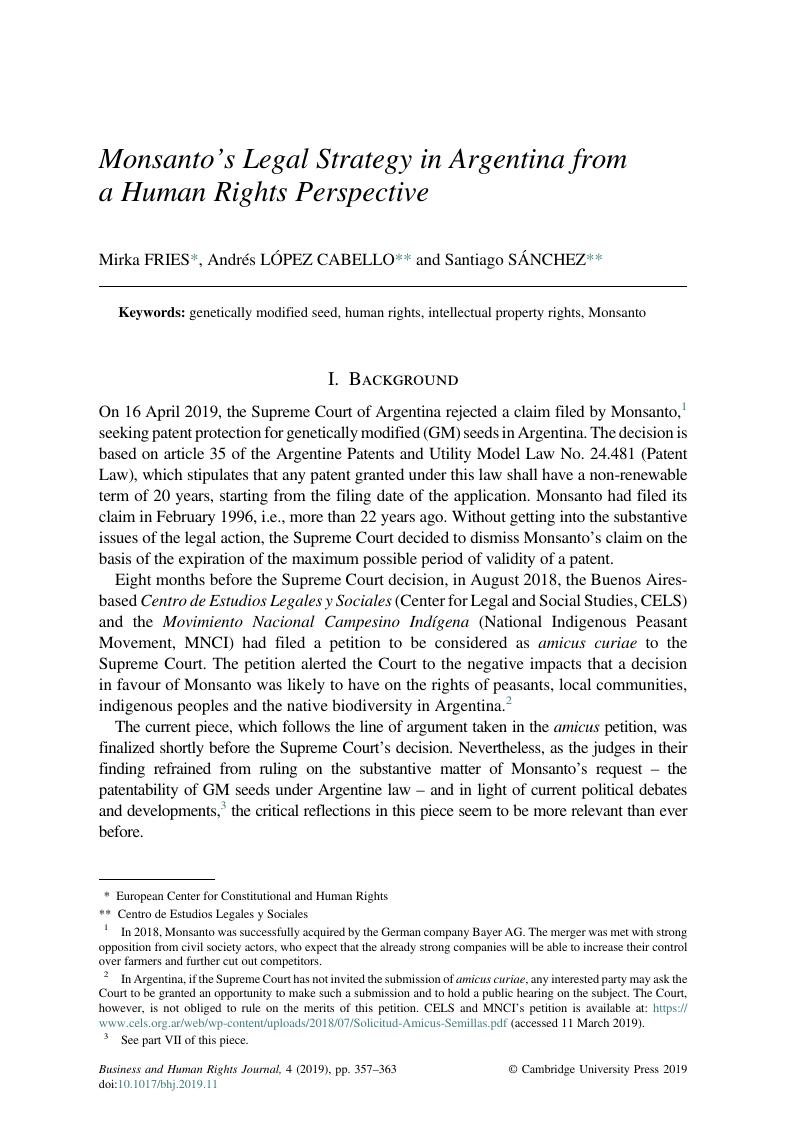Article contents
Monsanto’s Legal Strategy in Argentina from a Human Rights Perspective
Published online by Cambridge University Press: 10 July 2019
Abstract

- Type
- Developments in the Field – Special Issue on Agribusiness and Accountability
- Information
- Copyright
- © Cambridge University Press 2019
References
1 In 2018, Monsanto was successfully acquired by the German company Bayer AG. The merger was met with strong opposition from civil society actors, who expect that the already strong companies will be able to increase their control over farmers and further cut out competitors.
2 In Argentina, if the Supreme Court has not invited the submission of amicus curiae, any interested party may ask the Court to be granted an opportunity to make such a submission and to hold a public hearing on the subject. The Court, however, is not obliged to rule on the merits of this petition. CELS and MNCI’s petition is available at: https://www.cels.org.ar/web/wp-content/uploads/2018/07/Solicitud-Amicus-Semillas.pdf (accessed 11 March 2019).
3 See part VII of this piece.
4 ‘Preliminary Observations Special Rapporteur on the Right to Food, Hilal Ever, on her Mission to the [Republic of] Argentina 12–21 September 2018’, https://www.ohchr.org/EN/NewsEvents/Pages/DisplayNews.aspx?NewsID=23590&LangID=E (accessed 11 March 2019).
5 Data available via the National Bureau of Estimates, Delegations and Economic Studies, Office of the Undersecretary of Agriculture at the Ministry of Agribusiness, Presidency of the Nation, http://datosestimaciones.magyp.gob.ar/ (accessed 11 March 2019).
6 Carlos Correa, ‘La disputa Monsanto vs Argentina sobre la soja transgénica’ (2007) VIII:3 Revista Puentes 12.
7 GAIA/GRAIN, ‘Ten Reasons Not to Join UPOV’, 2 Global Trade and Biodiversity in Conflict (May 1998), https://www.grain.org/article/entries/1-ten-reasons-not-to-join-upov (accessed 11 March 2019).
8 Sell, Susan, ‘Multinational Corporations as Agents of Change: The Globalization of Intellectual Property Rights’ in Cutler, Claire, Haufler, Virginia and Porter, Tony (eds), Private Authority and International Affairs (New York: State University of New York, 1999), 169.Google Scholar
9 Sell, Susan, ‘What Role for Humanitarian Intellectual Property? The Globalization of Intellectual Property Rights’ (2004) 6 Minnesota Journal of Law Science & Technology 191, 203.Google Scholar
10 Law No. 24.481 (Argentina), arts 6 and 7.
11 UN Economic and Social Council, ‘The Impact of the Agreement on Trade-Related Aspects of Intellectual Property Rights on Human Rights’, Report of the High Commissioner, E/CN.4/Sub.2/2001/13 (27 June 2001), paras 2, 10.
12 UN Economic and Social Council, General Comment No. 24 on State obligations under the International Covenant on Economic, Social and Cultural Rights in the context of business activities, E/C.12/GC/24 (10 August 2017), para 24.
13 UN General Assembly, ‘Seed Policies and the Right to Food: Enhancing Agrobiodiversity and Encouraging Innovation’, Report of the Special Rapporteur on the right to food, A/64/170 (23 July 2009) para 36.
14 Ibid, para 38.
15 Charlotte Dreger and Gertrud Falk, ‘Zugang zu Saatgut und das Menschenrecht auf Nahrung’, FoodFirst 4/2016, p 4.
16 Preliminary Observations Special Rapporteur on the right to food, Hilal Ever, on her mission to the Argentina 12–21 September 2018, https://www.ohchr.org/EN/NewsEvents/Pages/DisplayNews.aspx?NewsID =23590&LangID=E (accessed 11 March 2019).
17 Agrovoz, ‘El Gobierno aprobó la venta de nuevos maices y sojas transgénicos’ (6 March 2018), http://agrovoz.lavoz.com.ar/agricultura/el-gobierno-aprobo-la-venta-de-nuevos-maices-y-sojas-transgenicos (accessed 11 March 2019).
18 The massive consequences the use of agrochemicals has on the health of its users was recently determined in a US court, where the plaintiff was awarded US$289 million compensation after the jury agreed with the plaintiff’s argument that his cancer had been caused by the glyphosate-based product Roundup. ‘Monsanto Ordered to Pay $289m as Jury Rules Weedkiller Caused Man’s Cancer’, The Guardian (11 August 2018), https://www.theguardian.com/business/2018/aug/10/monsanto-trial-cancer-dewayne-johnson-ruling (accessed 21 January 2019).
19 ‘Obtuvo dictamen el proyecto que modifica la Ley de Semillas’, iProfessional (13 November 2018), https://www.iprofesional.com/negocios/281402-exportaciones-agroquimicos-monsanto-A-pedir-de-Bayer-y-Monsanto-obtuvo-dictamen-y-entro-en-cuenta-regresiva-la-aprobacion-de-una-Ley-de-Semillas-que-privatiza-el-control-del-insumo (accessed 11 March 2019).
20 Article 9 of the EU proposal for a legal text on Intellectual Property Rights in the Trade Part of the EU-Mercosur Association Agreement, http://trade.ec.europa.eu/doclib/html/155070.htm (accessed 11 March 2019). To import ‘TRIPS-plus’ obligations into free trade agreements is a common practice for countries from the Global North. Peter Drahos, ‘Expanding Intellectual Property’s Empire: The Role of FTAs’, International Centre for Trade and Sustainable Development (2003), https://www.ictsd.org/sites/default/files/downloads/2008/08/drahos-fta-2003-en.pdf (accessed 11 March 2019).
- 1
- Cited by


